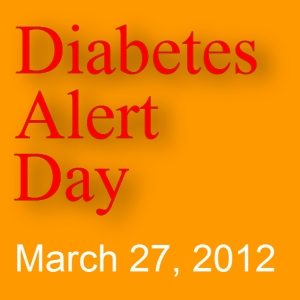Insulin Resistance, Weight Gain and Type 2 Diabetes: Connect the Dots

Have you heard the terms insulin resistance, insulin sensitivity and metabolic syndrome in the same breath as prediabetes and type 2 diabetes? Do you wonder how these terms are intertwined with prediabetes and type 2 diabetes?
Learn the terms and gather action steps put them in reverse or at least slow their progression over time.
What Is Insulin Resistance?
Insulin resistance most often occurs in people who are overweight. People who carry their extra weight around their middle – the abdomen or waist line - are at increased risk. The medical term for that apple shape is central adiposity.
Diabetes Alert Day: For Whom, For What?
 Yes, it’s Diabetes Alert Day, but who are all these red flags aimed at and to do what?
Yes, it’s Diabetes Alert Day, but who are all these red flags aimed at and to do what?
Who?
Around the world the who to alert on Diabetes Alert Day is hundreds of millions of people. The International Diabetes Federation offers tons of global facts and stats. Suffice to say there’s a type 2 diabetes tsunami already well on it’s way!
In the U.S. the Centers for Disease Control and Prevention’s (CDC) National Diabetes Fact Sheet tells us exactly who Diabetes Alert Day is targeted to:
7 million of the 26 million people with diabetes WHO do not yet know they have diabetes. If any of these 7 million people were tested today, they could be diagnosed with diabetes. For most of these people, it’s type 2 diabetes. (26 million people with diabetes represents over 8% of our population.)
70+ million people WHO could be diagnosed with prediabetes today. (Yes, you read this number correctly. Of the estimated 79 million Americans with prediabetes (that’s 35% of American adults), only 8% (and that’s being generous) know they have prediabetes and research shows not even half of these individuals (or their healthcare providers) are taking preventive efforts to slow it’s progression (Learn more in my blog Prediabetes, But Nearly No One Knows It.)
Book Review: The PCOS Diet Plan by Hillary Wright, MEd, RD
This is one in a series of book reviews. You may find these books beneficial if you: manage prediabetes or diabetes, follow a diabetes meal plan and/or try to eat healthy to live well. These book reviews also appear on amazon.com. The books can be found in my amazon a-store. Please check them out and consider a purchase.
- Have you been diagnosed with PCOS and are looking for help?
- Are you trying to solve the mystery of your infertility?
- Are you trying to put the following signs and symptoms together to diagnose your medical problem: irregular or no periods, hair growth in unwanted places, weight gain, above normal blood glucose levels?
- Have you ever heard of PCOS?
Fat: Not Simply Innocent Excess Pounds
I’m just back from the American Diabetes Association 2009 Scientific Sessions and feel compelled to shout out to all who will listen, especially parents of younger and older children and people on their way up the scale, that more and more research points to the many damaging impacts of excess pounds on long term health. Fat is not simply excess pounds of inactive tissue.
Vitamin D and Diabetes May be Linked
Research is snowballing pointing to deficient vitamin D levels as one factor contributing to the onset of both type 1 and 2 diabetes.
Prevent Dementia By Trimming Belly Bulge
Plenty of research points to the health dangers of excess belly – or abdominal – fat, from preventing type 2 diabetes, to high blood pressure and more. Last week, a study published in the journal Neurology conducted by Kaiser Permanente’s research arm, linked excess belly fat to a high risk of dementia. Researchers found that the more belly fat participants were toting around, the greater their risk for dementia.
Face the Facts and Figures about Pre- and Type 2 Diabetes, Next Take Action
The facts and figures about the financial costs of diabetes as well as the numbers of children and adults at risk of developing type 2 diabetes due to genetics, but more so being overweight, are staggering…and “sobering” as noted by Drs Judith Fradkin and Griffin Rodgers, from the diabetes division of the National Institutes of Health, in their Diabetes Care editorial The Economic Imperative to Conquer Diabetes (extract).

